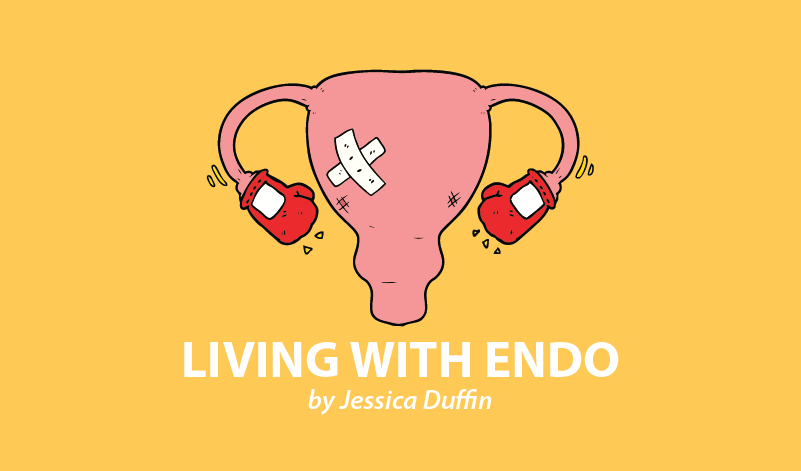I have way too many skeletons in my closet. On either side of those skeletons hang endometriosis, anxiety, and depression.
Endometriosis is often exacerbated by stress, and walking around with the stress of depression, anxiety, and other psychological issues makes it harder for me to cope with the condition. Sometimes dealing with this closet alone — especially when endometriosis symptoms make life pretty tough anyway — is not always possible. I am a true believer in the support of therapy, and it has been something I’ve returned to again and again in my life over the years.
I recently discussed the ways in which I believe cognitive behavioral therapy (CBT) can be beneficial for endometriosis. But one issue I had with CBT is that, at least in my experience, I felt like I could never really go that deep into my issues, deep into my memories, deep into my behaviors. We got to the pain point often quite quickly and then would look into relearning my behaviors quickly as well.
I’ve nearly always had CBT on the National Health Service, and so I’ve only had a limited number of weeks, and I suspect the doctors I’ve seen are encouraged to get to the solution as soon as possible. While I appreciate this, I’m always left feeling like I need more.
After reaching a brick wall with endometriosis, depression, and anxiety, I sought out psychotherapy — which is an umbrella term for talking therapy. The specific therapy I opted for was psychoanalytic psychotherapy, defined by the British Psychoanalytic Council as: “Psychoanalytic or psychodynamic psychotherapy draws on theories and practices of analytical psychology and psychoanalysis. It is a therapeutic process which helps patients understand and resolve their problems by increasing awareness of their inner world and its influence over relationships both past and present. It differs from most other therapies in aiming for deep seated change in personality and emotional development.
“Psychoanalytic and psychodynamic psychotherapy aim to help people with serious psychological disorders to understand and change complex, deep-seated and often unconsciously based emotional and relationship problems, thereby reducing symptoms and alleviating distress.”
I was warned before going into it that psychotherapy can be a very difficult and long process, and you don’t always feel better at first. In fact, it can often make you feel worse for a while. When I began this therapy, I was in the darkest space I’d been in many years, and it was suggested that I take antidepressants to help me cope with the therapy and move through it a little easier. For reasons I won’t go into right now, I chose not to take the tablets and went ahead with the therapy anyway.
I ended up crying a lot in psychotherapy. I also talked a lot. And apparently, the therapists can’t give much away to their patient (or so I heard), so I often felt very isolated in that room, talking to a woman who didn’t give me much back in return. I left those sessions with tears streaming from my eyes, and it did get to the point where I was paying a lot of money to be in a lot of pain that I wasn’t really ready to deal with. Eventually, I stopped those sessions and picked up again with CBT.
While I get that it sounds like psychotherapy wasn’t any good for me, it was. It was a relief to finally blurt out how hard everything had been with endometriosis, and my eating disorders, and my family, and my relationships, and all the rest. I hadn’t ever really been given that free rein to just go for it and spill it all out. It was painful, yes, but necessary. And though I did stop, it wasn’t because I didn’t believe in it. I just couldn’t cope with it then.
Maybe I needed to take the antidepressants, or maybe a period of CBT would have helped first to get me to a stronger place, but it just wasn’t the right time for me.
Psychoanalytic psychotherapy is, in my experience, hard work and very intense, and may not be the right type of therapy for you. However, if you feel you need to talk to someone in-depth and at length, and really take a rake over certain issues so you can find some peace with them, this may be what you need.
My personal recommendation is to know what you’re going into — do your research, call around, and seek medical advice. The most important thing is to pursue this when it’s the right time and you feel ready emotionally. Then you can begin healing.
***
Note: Endometriosis News is strictly a news and information website about the disease. It does not provide medical advice, diagnosis, or treatment. This content is not intended to be a substitute for professional medical advice, diagnosis, or treatment. Always seek the advice of your physician or other qualified health provider with any questions you may have regarding a medical condition. Never disregard professional medical advice or delay in seeking it because of something you have read on this website. The opinions expressed in this column are not those of Endometriosis News or its parent company, BioNews Services, and are intended to spark discussion about issues pertaining to endometriosis.


